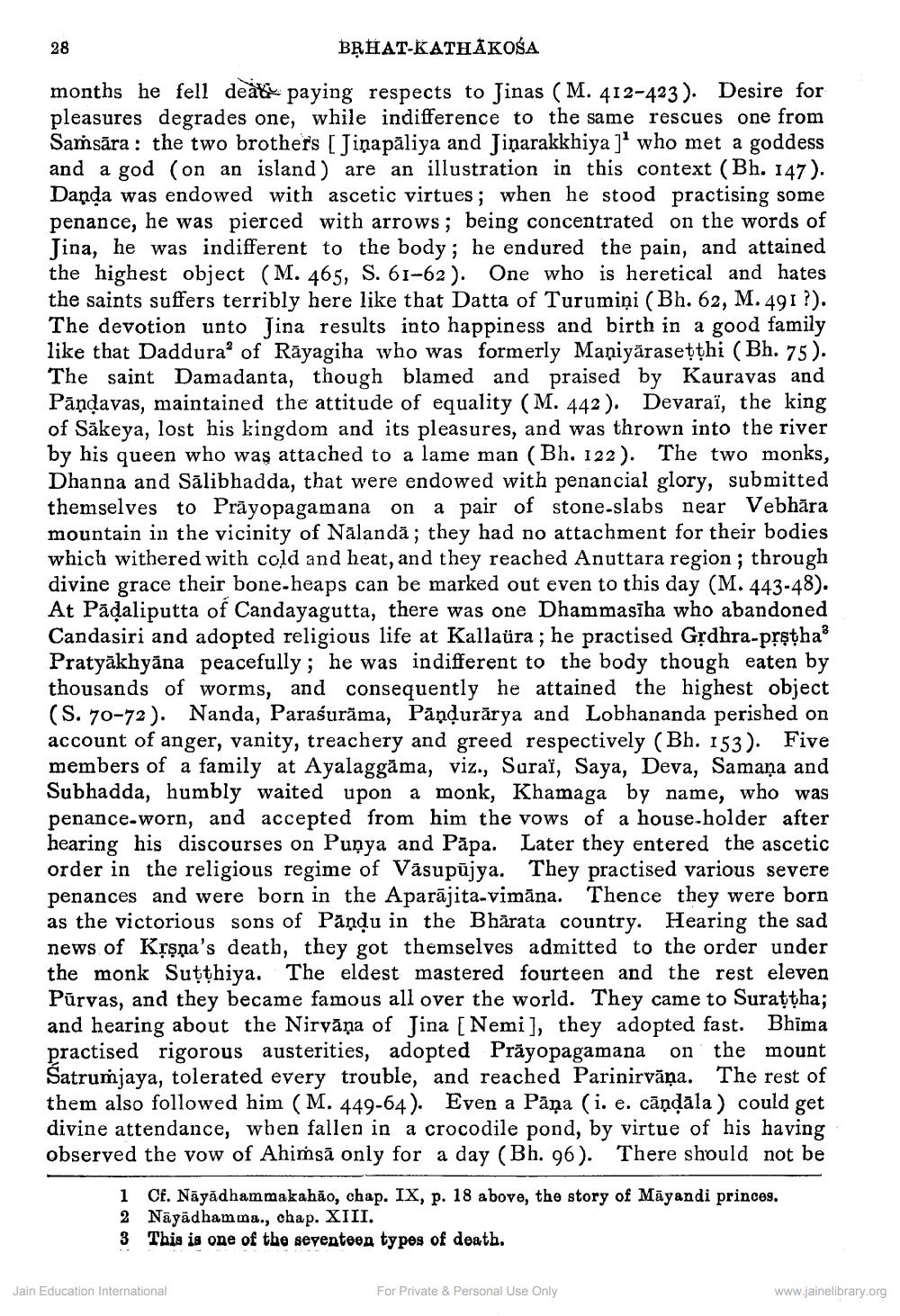________________
28
BREAT-KATHẮKOSA
months he fell deak paying respects to Jinas (M. 412-423). Desire for pleasures degrades one, while indifference to the same rescues one from Samsāra : the two brothers [ Jiņapāliya and Jiņarakkhiya ]' who met a goddess and a god (on an island) are an illustration in this context (Bh. 147). Danda was endowed with ascetic virtues; when he stood practising some penance, he was pierced with arrows; being concentrated on the words of Jina, he was indifferent to the body; he endured the pain, and attained the highest object (M. 465, S. 61-62). One who is heretical and hates the saints suffers terribly here like that Datta of Turumiņi (Bh. 62, M.491 ?). The devotion unto Jina results into happiness and birth in a good family
addura of Rāyagiha who was formerly Maniyārasetthi (Bh. 75). The saint Damadanta, though blamed and praised by Kauravas and Pāndavas, maintained the attitude of equality (M. 442). Devaraï, the king of Sākeya, lost his kingdom and its pleasures, and was thrown into the river by his queen who was attached to a lame man (Bh. 122). The two monks, Dhanna and Sālibhadda, that were endowed with penancial glory, submitted themselves to Prāyopagamana on a pair of stone-slabs near Vebhāra mountain in the vicinity of Nalanda; they had no attachment for their bodies which withered with cold and heat, and they reached Anuttara region; through divine grace their bone heaps can be marked out even to this day (M. 443-48). At Padaliputta of Candayagutta, there was one Dhammasiha who abandoned Candasiri and adopted religious life at Kallaüra; he practised Grdhra-prştha Pratyākhyāna peacefully; he was in different to the body though eaten by thousands of worms, and consequently he attained the highest object (S. 70-72). Nanda, Parasurăma, Pāņdurārya and Lobhananda perished on
ount of anger, vanity, treachery and greed respectively (Bh. 153). Five members of a family at Ayalaggāma, viz., Suraï, Saya, Deva, Samaņa and Subhadda, humbly waited upon a monk, Khamaga by name, who was penance.worn, and accepted from him the vows of a house holder after hearing his discourses on Punya and Păpa. Later they entered the ascetic order in the religious regime of Vāsupūjya. They practised various severe penances and were born in the Aparājita-vimāna. Thence they were born as the victorious sons of Păņdu in the Bhårata country. Hearing the sad news of Krşņa's death, they got themselves admitted to the order under the monk Sutthiya. The eldest mastered fourteen and the rest eleven Pūrvas, and they became famous all over the world. They came to Surattha; and hearing about the Nirvāņa of Jina [Nemi], they adopted fast. Bhima practised rigorous austerities, adopted Prāyopagamana on the mount Satruńjaya, tolerated every trouble, and reached Parinirvāņa. The rest of them also followed him (M. 449-64). Even a Pāņa (i. e. cāņdāla) could get divine attendance, when fallen in a crocodile pond, by virtue of his having observed the vow of Ahimsā only for a day (Bh. 96). There should not be
1 Cf. Nāyādhammakahão, chap. IX, p. 18 above, the story of Māyandi princes. 2 Nāyādhamma., chap. XIII. 3 This is one of the seventeen types of death.
Jain Education International
For Private & Personal Use Only
www.jainelibrary.org




